Contact Us
To provide feedback on the Community Policing Dispatch, e-mail the editorial board at CPDispatch@usdoj.gov.
To obtain details on COPS Office programs, publications, and resources, contact the COPS Office Response Center at 800-421-6770 or AskCopsRC@usdoj.gov

U.S. Department of Justice
Office of Community Oriented Policing Services
Washington, DC 20530
Tourists do the darndest things: leave hotel room doors propped open, wade into traffic with eyes fixed on cell phones, and climb lamp posts to take selfies, to name a few. They sometimes feel as if local laws and safety precautions don’t apply when they’re on holiday. Or, as one police chief remarked, “Some leave their brains at home when they go on vacation.”
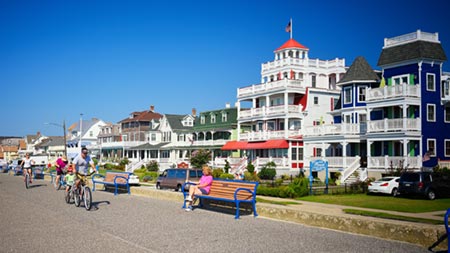 In addition to being easy prey for criminals, out-of-towners seldom report crime, much less testify against a suspect. They can also cause serious problems themselves, usually by disregarding traffic laws or becoming drunk and disorderly, but occasionally by engaging in criminal activity.
In addition to being easy prey for criminals, out-of-towners seldom report crime, much less testify against a suspect. They can also cause serious problems themselves, usually by disregarding traffic laws or becoming drunk and disorderly, but occasionally by engaging in criminal activity.
All of this can make policing tourist destinations challenging—especially in small towns, such as beach or mountain resorts, whose populations may grow ten- or even hundredfold in peak season. Dealing with the additional load on their services and personnel may not be easy, but many local departments have found ways to keep both visitors and community safe and happy while not breaking the bank.
Extra Eyes and Ears for the Force
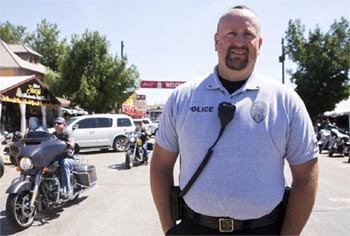
Police Chief Geody VanDewater, Sturgis (South Dakota) Police Department
Community policing is especially important in these destinations, where police rely on hotel clerks, bartenders, boutique owners, and others who are on the front line of the tourist scene to be their eyes and ears. In Sturgis, South Dakota, which holds a ten day motorcycle rally and music festival that attracts around 500,000 additional people to the town of 7,000 every July, Police Chief Geody VanDewater holds a pre-rally meeting with bars and liquor establishments.
“I want to have working relationships with these individuals so that if I have issues, or they do, we have direct contact with each other,” he says. There have been shootings in these bars, and their staff have helped the department by giving statements. They have their own security, but rely on us to remove intoxicated and unruly patrons.”
”Community policing is important to us in other ways too,” VanDewater adds. “We encourage our officers to have friendly interaction with tourists as well as locals, and they do interact, chatting and taking pictures with people. They enjoy doing it too because pretty much everybody is friendly during the rally.”
Internships for Seasonal Officers
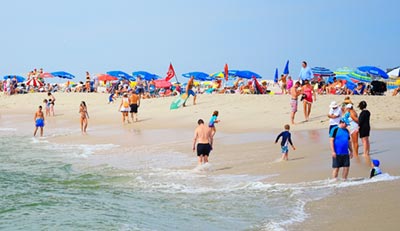 Augmenting their forces with seasonal personnel is another response to tourist needs. In addition to being less costly—often these individuals are non-paid volunteers—they allow departments to keep full-time officers on their beats. Cape May, New Jersey, a beach resort with a year-round local population of about 5,400 that grows to around 60,000 in summer, is one example. To expand its police force of 25 officers, the department hires students for two different levels of policing services, both of which qualify for internship credit at their colleges.
Augmenting their forces with seasonal personnel is another response to tourist needs. In addition to being less costly—often these individuals are non-paid volunteers—they allow departments to keep full-time officers on their beats. Cape May, New Jersey, a beach resort with a year-round local population of about 5,400 that grows to around 60,000 in summer, is one example. To expand its police force of 25 officers, the department hires students for two different levels of policing services, both of which qualify for internship credit at their colleges.
Class One Special Law Enforcement Officers (SLEO I) are trained and empowered to issue summonses for parking and local ordinance enforcement, and for minor incidents such as disorderly behavior, but they do not carry a firearm. While employed, Class Two Seasonal Law Enforcement Officers (SLEO II) have the authority and arrest powers of fulltime police officers, and they carry a firearm. Most SLEOs are studying criminal justice and all get credit for the internship from their colleges.
Off Duty Cops and Safety Ambassadors
The Sturgis Police Department usually hires 15 volunteer officers, who come in from all over the country to work full-time during the rally. Some are employed by other agencies and take leave to do this; others are retired. According to Chief VanDewater, they come for the camaraderie. “One guy has been doing this for 41 years,” he says. “To recruit, we put the word out through emails, in social media, and in local fusion centers. We outfit them with grey polo shirts and feed them, but they work for the fun of it.”
Though they are not employees of the Grand Rapids (Michigan) Police Department, Safety Ambassadors hired by Downtown Grand Rapids, Inc. and managed by the Block by Block Company are assets to the department. Block by Block provides safety, cleaning, and outreach services to downtown improvement districts in customizable programs, which Grand Rapids adapted to their public safety needs.
Many of their Ambassadors receive training in skills such as physical and mental health first aid, treating drug overdoses, and spotting sex trafficking. Though not trained to intervene in crime, they have been credited with stopping a potential burglary and a domestic abuse situation. Just as importantly, they know how to be good witnesses and call the police for assistance or to report a crime. According to Rebecca Krenz, Operations Manager of the Downtown Grand Rapids Ambassador Program, “We're feet on the streets and often first on the scene when things happen.”
Recruitment and Housing Options
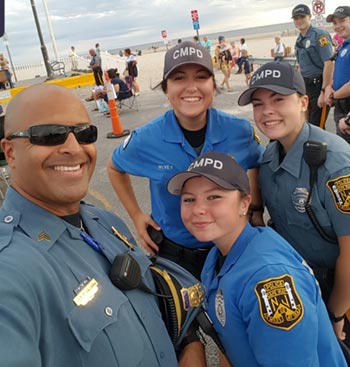 Students in criminal justice programs are good candidates for seasonal employment programs, and Chief Anthony Marino of the Cape May City Police Department says “Facebook is a good way to reach them. We also use an online recruiting and hire program called policeapp.com. The state police academy advertises SLEO II positions too, and like many departments, we reach out directly to local colleges and attend job fairs.”
Students in criminal justice programs are good candidates for seasonal employment programs, and Chief Anthony Marino of the Cape May City Police Department says “Facebook is a good way to reach them. We also use an online recruiting and hire program called policeapp.com. The state police academy advertises SLEO II positions too, and like many departments, we reach out directly to local colleges and attend job fairs.”
Yet recruitment isn’t always easy, even in desirable vacation locations. A big obstacle is housing. The Ocean City (Maryland) Police Departmental Housing Program leases homes, which they sublease at cost to seasonal employees. They also have a Housing Alternatives List, with contact information for departmental officers, officers from other agencies, and friends of the department with houses or rooms for rent. Another option is their Facebook group, where seasonal employees can discuss housing and find roommates.
Sources for Financial Support
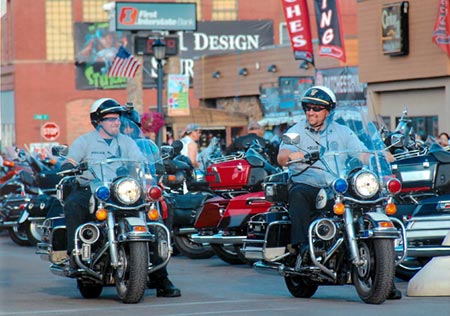 While providing services for tourists may require increased resources, revenue from room and meal taxes help pay for them. In addition, some local attractions pay directly for security services. Busch Gardens Williamsburg and Water Country USA, two amusement parks in York-Poquoson County, Virginia, contract with the sheriff’s office for the services of off-duty deputies to work in the resorts and their parking lots.
While providing services for tourists may require increased resources, revenue from room and meal taxes help pay for them. In addition, some local attractions pay directly for security services. Busch Gardens Williamsburg and Water Country USA, two amusement parks in York-Poquoson County, Virginia, contract with the sheriff’s office for the services of off-duty deputies to work in the resorts and their parking lots.
There are additional sources for funding as well. Chief Marino of the Cape May Police Department suggests trying foundations supported by various companies. “The WaWa Foundation, which supports a Heroes Award, provided funding for load bearing vests for our officers, to lessen the load on their duty belts, which can cause back programs. Companies like that may fund other needs. It may be possible to find someone in the community to do research and writing for grant funding.”
In some cities and larger resort destinations, tourist boards fund law enforcement efforts to maintain public safety. According to a June 4, 2018 article in the Tennessean newspaper, the Nashville Convention and Visitors Corp provides its city police department with an annual grant of $100,000 to ensure tourist safety, and also pays for police overtime at special events.
In Nevada, the Las Vegas Convention and Visitors Authority funds an analyst at the Las Vegas Metro Police Department’s Southern Nevada Counter Terrorism Center who is responsible for sharing safety information from the police department with the tourism community, and acts as a liaison between event producers, resort partners, and local public safety agencies.1
The Bottom Line
Tourism is a growing source of employment and revenue throughout our country. According to the U.S. Travel Association, direct spending by domestic and international travelers in the U.S. averaged $3 billion a day for a total of $1.1 trillion in 2018. According to the association’s Travel Impact Calculator, the economic impact of a 4.95 percent increase in 2019 travel spending could result in almost $4 billion in additional state and local tax revenues, which could fund the hiring of an additional 60,300 American law enforcement officers.
What’s more, the benefits of tourism extend beyond the revenue, to the interactions that all members of the community, including law enforcement officers, have with people from all over the U.S. and the world. Like other members of the community, the men and women in blue are ambassadors for their towns and for our country, and their contacts with travelers can leave a positive lasting impression.
Tourism will continue to pose challenges as it grows, but creative approaches to meeting them will open new opportunities for relationships and collaboration within and outside of their community—a win-win for everybody.
Faye Elkins
Sr. Technical Writer
Sources for More Information
Planning and Managing Security for Major Special Events: Training Curricula
Planning and Managing Security for Major Special Events: Guidelines for Law Enforcement
References:
1. https://skift.com/2018/07/16/tourism-boards-offer-funding-to-city-police-departments-to-boost-security/
Subscribe to Email Updates
To sign up for monthly updates or to access your subscriber preferences, please enter your email address in the Subscribe box.






